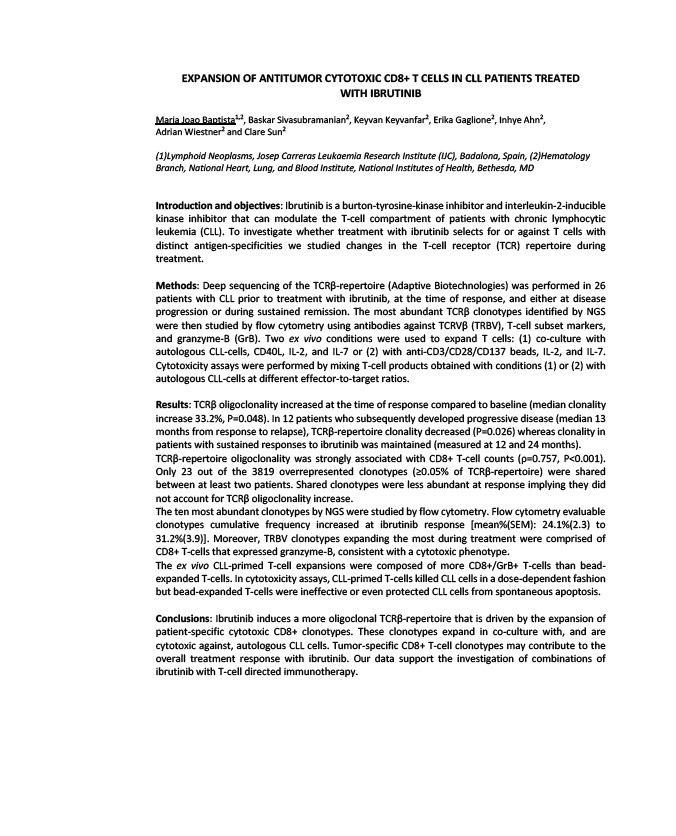
EXPANSION OF ANTITUMOR CYTOTOXIC CD8+ T CELLS IN CLL PATIENTS TREATED
WITH IBRUTINIB
Maria Joao Baptista1,2, Baskar Sivasubramanian2, Keyvan Keyvanfar2, Erika Gaglione2, Inhye Ahn2,
Adrian Wiestner2 and Clare Sun2
(1)Lymphoid Neoplasms, Josep Carreras Leukaemia Research Institute (IJC), Badalona, Spain, (2)Hematology
Branch, National Heart, Lung, and Blood Institute, National Institutes of Health, Bethesda, MD
Introduction and objectives: Ibrutinib is a burton-tyrosine-kinase inhibitor and interleukin-2-inducible
kinase inhibitor that can modulate the T-cell compartment of patients with chronic lymphocytic
leukemia (CLL). To investigate whether treatment with ibrutinib selects for or against T cells with
distinct antigen-specificities we studied changes in the T-cell receptor (TCR) repertoire during
treatment.
Methods: Deep sequencing of the TCRβ-repertoire (Adaptive Biotechnologies) was performed in 26
patients with CLL prior to treatment with ibrutinib, at the time of response, and either at disease
progression or during sustained remission. The most abundant TCRβ clonotypes identified by NGS
were then studied by flow cytometry using antibodies against TCRVβ (TRBV), T-cell subset markers,
and granzyme-B (GrB). Two ex vivo conditions were used to expand T cells: (1) co-culture with
autologous CLL-cells, CD40L, IL-2, and IL-7 or (2) with anti-CD3/CD28/CD137 beads, IL-2, and IL-7.
Cytotoxicity assays were performed by mixing T-cell products obtained with conditions (1) or (2) with
autologous CLL-cells at different effector-to-target ratios.
Results: TCRβ oligoclonality increased at the time of response compared to baseline (median clonality
increase 33.2%, P=0.048). In 12 patients who subsequently developed progressive disease (median 13
months from response to relapse), TCRβ-repertoire clonality decreased (P=0.026) whereas clonality in
patients with sustained responses to ibrutinib was maintained (measured at 12 and 24 months).
TCRβ-repertoire oligoclonality was strongly associated with CD8+ T-cell counts (ρ=0.757, P<0.001).
Only 23 out of the 3819 overrepresented clonotypes (≥0.05% of TCRβ-repertoire) were shared
between at least two patients. Shared clonotypes were less abundant at response implying they did
not account for TCRβ oligoclonality increase.
The ten most abundant clonotypes by NGS were studied by flow cytometry. Flow cytometry evaluable
clonotypes cumulative frequency increased at ibrutinib response mean%(SEM): 24.1%(2.3) to
31.2%(3.9). Moreover, TRBV clonotypes expanding the most during treatment were comprised of
CD8+ T-cells that expressed granzyme-B, consistent with a cytotoxic phenotype.
The ex vivo CLL-primed T-cell expansions were composed of more CD8+/GrB+ T-cells than bead-expanded
T-cells. In cytotoxicity assays, CLL-primed T-cells killed CLL cells in a dose-dependent fashion
but bead-expanded T-cells were ineffective or even protected CLL cells from spontaneous apoptosis.
Conclusions: Ibrutinib induces a more oligoclonal TCRβ-repertoire that is driven by the expansion of
patient-specific cytotoxic CD8+ clonotypes. These clonotypes expand in co-culture with, and are
cytotoxic against, autologous CLL cells. Tumor-specific CD8+ T-cell clonotypes may contribute to the
overall treatment response with ibrutinib. Our data support the investigation of combinations of
ibrutinib with T-cell directed immunotherapy.